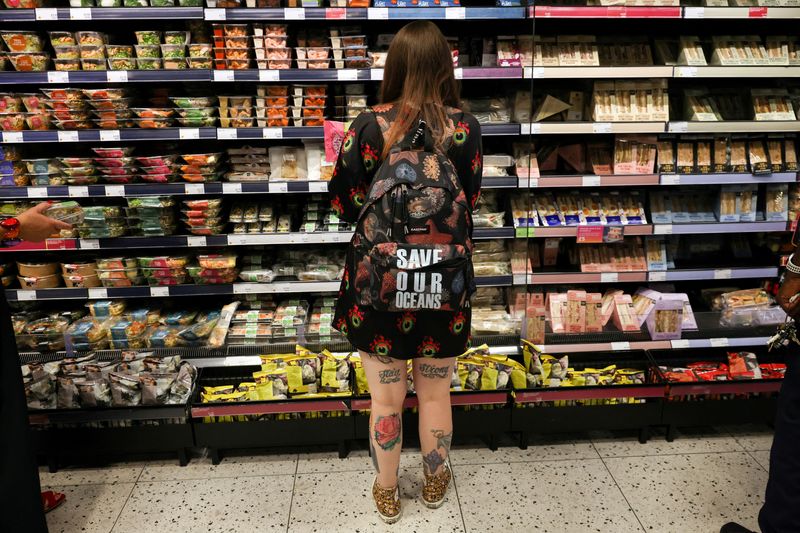By William Schomberg and Andy Bruce
LONDON (Reuters) - British inflation fell in April but by less than expected and it remains above the rate of price growth in the United States and most of Europe, putting pressure on the Bank of England to keep raising interest rates.
Britain has struggled more than other countries with the surging cost of food, a shortage of workers to fill jobs and its heavy reliance on natural gas to generate power and domestic heating, all of which adds to inflation pressure.
Below is an explanation of Britain's high inflation problem.
HOW DOES UK INFLATION COMPARE TO OTHER COUNTRIES?
Britain's consumer price index rose by 8.7% in annual terms in April, down from 10.1% in March and 11.1% last October. But it still left the country with the joint highest inflation rate among Group of Seven advanced economies alongside Italy.
By comparison, inflation in the United States stood at just under 5% and 7.6% in Germany. In western Europe, only Austria had a higher rate.
WHAT ABOUT CORE INFLATION?
Britain's measure of underlying inflation that excludes volatile items, such as energy and food, took investors by surprise by rising sharply in April to 6.8% from 6.2% in March.
Higher core inflation is seen as a sign that price growth is more likely to remain persistently high.
Another gauge of underlying price pressure that is watched closely by the BoE - services price inflation - also rose. Both increases were the strongest in more than 30 years.
WHY IS FOOD INFLATION SO HIGH IN THE UK?
Britain has western Europe's highest rate of inflation for food, with prices up more than 19% over the past year - the country's worst such run since 1977.
The average price of milk and eggs increased by more than a third during the year to April. Inflation for sugar and olive oil is running closer to 50%.
Freak weather has affected crops around the world, pushing up prices for many countries. But Britain is the world's third largest net importer of food and drink, according to the Food and Agriculture Organization of the United Nations - behind only China and Japan - leaving it particularly exposed.
BoE Governor Andrew Bailey said on Tuesday that British food producers may also have locked in higher costs than the BoE had anticipated.
ENERGY PRICES
Britain is highly reliant on imported gas to generate electricity, exposing it to the full force of the surge in gas prices last year after Russia's invasion of Ukraine.
The way Britain regulates energy prices for domestic and business users - it announces changes to maximum tariffs on a quarterly basis - means that international price rises are slower to push up inflation than in many other countries but falls are also slower to feed through into bills for users.
IS BREXIT PART OF THE PROBLEM?
Britain voted in 2016 to exit the European Union and it left the EU's single market at the start of 2021. Although London and Brussels have an agreement allowing largely tariff-free trade in goods, there are barriers to exports and imports in the form of paperwork which have caused delays and higher costs.
The end of free movement of workers from EU countries has contributed to a shortage of staff faced by many employers that is more acute in Britain than in many other economies and which has pushed up wages and ultimately prices for consumers.
WHAT DO PEOPLE THINK WILL HAPPEN WITH INFLATION?
The British public's expectations for rising prices have cooled somewhat in recent months, perhaps the only bright spot for the BoE as it monitors the risk of an inflation psychology becoming engrained in consumer behaviour.
But those expectations remain elevated.
With inflation falling at a slower pace than the BoE had hoped, it will worry that expectations could still become de-anchored - meaning the public and businesses no longer believe inflation will return to the BoE's 2% target.
WHAT IS THE BANK OF ENGLAND LIKELY TO DO?
Investors and analysts responded immediately to Wednesday's data by pricing in more interest rate increases than they had previously been expecting.
Rate futures showed investors saw a 100% chance that the BoE will raise rates to at least 4.75% in June from 4.5% now, and a roughly 60% chance that rates will hit 5.5% by November.

Bank of America (NYSE:BAC) and Japanese bank Nomura both said they now expect the BoE to raise its main interest rate three more times to 5.25% by September, while Credit Suisse (SIX:CSGN) and Citi see two more increases to 5%.
($1 = 0.7923 pounds)